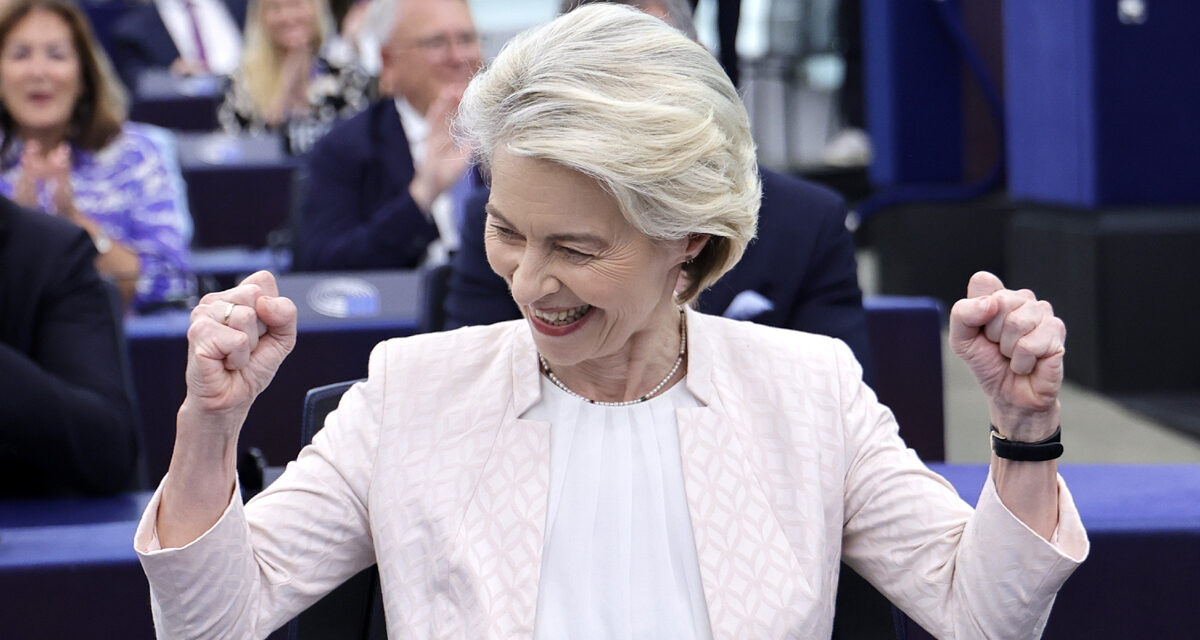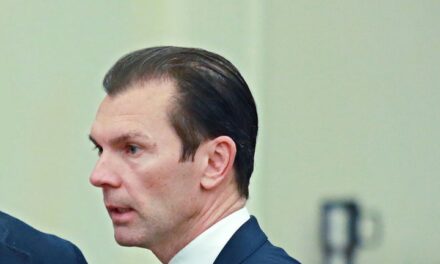The trade war launched against China is Ursula von der Leyen's personal matter, but in this fight the EU may not only do poorly, but may even bleed to death.
The European Union voted to finalize the punitive duties imposed on Chinese electric cars. Germany tried to block the imposition of the extra tax for five years, but in the end the French bloc prevailed. And of course Ursula von der Leyen, who treated the case as one of the most important tests for consolidating her power.
The European Commission's anti-subsidy investigation into the import of Chinese electric cars lasted nearly a year. According to Ursula von der Leyen, because of the disproportionate size of state subsidies, Beijing is able to pursue a dumping policy and flood the European market with cheap cars. After the commission saw the accusation as well-founded, in the first round it imposed temporary extra duties on top of the existing 10 percent tariffs on the products of Chinese companies or companies manufacturing in China.
The cheapest was Tesla, whose duty of around 7.8 percent is almost dwarfed by SAIC 10 plus 35.3 percent. BYD was fined 17 percent, while Geely was fined 18.8 percent.
In the vote held in July, which was still temporary due to the establishment of customs duties, only Hungary (as the main supporter of bringing Chinese investments into the EU), Cyprus, Malta and Slovakia voted against the measures – another eleven member states, including Germany, which stood to lose the most, abstained from voting. According to the rules, the European Commission would only be forced to withdraw its draft if 15 EU countries, representing 65 percent of the EU's population, vote against the plan. With this in mind, France, which also demanded the original anti-subsidy investigation, quickly brought together its own bloc: in addition to Greece, Italy and Poland, the strongest camp of those voting for tariffs represented 39 percent of the EU population.
Germany, Hungary, Cyprus, Malta and Slovakia voted against the finalization of customs duties on October 4, ten member states said yes, and twelve abstained. The number of the latter may be somewhat surprising, but Ursula von der Leyen can see this as a gift just as if those twelve had voted yes. According to the law, if the participants do not say a unanimous yes or a unanimous no, i.e. the 65 percent ratio is not reached, the decision-making power falls into the hands of the European Commission, i.e. VDL can finalize the available punitive duties of up to 35.3 percent.
It's a personal matter
The European Union voted for one of the most far-reaching trade measures in recent years, thereby risking an escalation of the already tense situation between the EU and China, which in the worst case could lead to the destructive completion of a trade war, thereby further amortizing the competitiveness of the Union.
However, the finalization of the plan and the vote with a favorable outcome for her were more important than anything and everyone for Ursula von der Leyen. The president of the European Commission wants to make the bloc a geopolitical and geoeconomic superpower again, which, in his view, would be an impossible endeavor without economic security. He is absolutely right in this, however, the methods with which he is trying to create a basis for this have provoked fierce opposition from several member states.
The history of punitive tariffs is the essence of von der Leyen's China policy. The EC president insists on the idea that Beijing seeks to change the international order and subordinates all means, including the use of "unfair" trade practices, to this goal.
The principle of independence from China plays a central role in Von der Leyen's ideas about the European economy, but even he has lost ground in the case of punitive tariffs - the political and commercial risks can be so serious that the initiative and the supervision of the mechanism can easily slip out of his hands.
In the trade war launched against China, the EU may not only fare badly, but it may even bleed to death due to its severe lack of competitiveness and capacity.
The vote on extra tariffs was therefore not simply a commercial decision, but also a vote in favor of Ursula von der Leyen's China policy. In light of this, however, the number of stays can also be a silent warning to the President of the EC.
However, Chancellor Scholz really did everything he could to bring together an anti-tariff bloc: his argument, in line with European economic interests, was of course about Germany. Due to the Chinese interests and entanglements of the German industrial players (primarily the car factories), he is rightly concerned about the possibility of a possible counterattack - for the time being, Beijing has "only" targeted EU food industry export products with anti-subsidy investigations similar to the one in Brussels, but its flag can fall on German industrial manufacturers at any time. which could be dealt a fatal blow by another restrictive or prohibitive measure.
The trade war would therefore clearly affect the German car manufacturers the most, especially the already depressed Volkswagen and BMW, which sold a total of 4.6 million cars in China in 2022. However, what hurts the German car industry hurts the whole of Europe, and Hungary - which connects the eastern and western car industry - especially.
Scholz tried to argue that a significant part of the cars coming from China are actually European, which are manufactured in the Asian country - so the European Commission is punishing the domestic manufacturers. According to Finance Minister Christian Lindner, a trade war with China would do far more harm than good for the key European industry, as well as German car production, which is one of its pillars. However, the realization of the German intention was delayed in the government coalition: the Free Democrats (Finance Minister Lindner) and the chancellor's Social Democratic party interpret the events differently, and the Greens (Economics Minister Robert Habeck), who, even if they did not agree 100% with the Brussels decision, they were far from abstaining from the application of the penal policy.
The spectacular lack of unity caused the tragicomic situation in Brussels in July, when Germany abstained from the vote instead of rejecting it, once again highlighting the impotence of its own government, which now also harms national economic interests.
The fact that Scholz was able to say a no-stakes but firm no in the vote on October 4 is due to the fact that he used his chancellor's right called Richtlinienkompetenz, which gives him the opportunity to ignore the will of his government in certain cases and make quasi-one-man decisions . (The mechanism is extremely rarely used by German leaders, it was introduced by Konrad Adenauer in 1957 before the war in Ukraine - until Scholz used it in October 2022 in order to keep the last German nuclear power plants in operation.)
And how is the competitiveness?
While Ursula von der Leyen wrote a report with the former head of the ECB, Mario Draghi, on saving European competitiveness, an army of analysts point out that the imposition of punitive tariffs is exactly the opposite of the EU's goals, i.e. it will further destroy competitiveness, which is already in a dead state.
Most recently and most emphatically, Rudy Aernoudt, the former chief economist of the European Commission, pointed out the counterproductive nature of the situation. As he said
if Chinese car production is artificially pushed into the background, it will be a short-term advantage for European car manufacturers, but in the long run it will lead to further damage to competitiveness – if there is no competition, there is no motivation to achieve primacy.
According to Aernoudt, the situation should be handled with cooperation instead of prohibitions and protectionist measures, because it will be impossible to avoid China, whether in industry or trade. "Why shouldn't Chinese companies be encouraged to invest in Europe? 35 percent of the world's manufacturing process is in China. We can oppose "Made in China", but the fact remains a fact. If you want to do business, you have to work with Chinese suppliers and customers," he said, adding that globalization as we know it may be coming to an end, but then a smarter version of it will have to be invented to avoid deadlock and the global trade system. complete collapse.
For his part, Prime Minister Viktor Orbán called the process started by the Brussels move an economic cold war, which will seal the competitiveness of the European Union. Minister of Foreign Affairs and Trade Péter Szijjártó sounded the same alarm the day before the vote, not skimping on the strong adjectives.
"Brussels bureaucrats are preparing to ritually kill European competitiveness. Chinese tariffs are against the interests of European car manufacturers, risky and dangerous. Hungary takes a firm position and votes no to this proposal"
said the head of the ministry.
In vain.
Let's talk some more!
Despite the decision, the Chinese and EU negotiators will continue the dialogue in the coming weeks, that is, the European Commission does not shy away from the idea that in the future - if it manages to find a solution it deems fair - it will correct the current decision. The clock is ticking, the deadline expires on October 30, and the fixed extra duties come into effect on November 1.
Of course, Beijing attacked and criticized the EC's plan in every existing forum, calling it an undisguised protectionist move and an artificial fabrication supported by exaggerated evidence. However, the Chinese investigations aimed at the European food industry, launched as another step in the trade war, had the expected effect: the European Commission was visibly embarrassed and demanded an immediate halt to the investigations from Beijing, which in response emphasized the importance of "friendly dialogue", not forgetting to mention that
if the consultations do not yield results, China will no longer bear any responsibility for the consequences.
One possible solution to abolishing the extra duties would be to voluntarily raise the price of Chinese export cars or reduce the export volume. BYD, Geely and SAIC are also willing to introduce some self-restrictions, but the European Commission last week found their proposal ridiculous and swept it off the table. The situation has therefore become urgent: Chinese manufacturers now have to figure out whether they will absorb the difference between the extra duties and the original price, or do what the European Commission expects of them, i.e. pass on the duties to consumers, thereby increasing them due to the cheap goods the price of electric vehicles. The third option is perhaps the most promising:
similar to BYD, which is currently building its first European factory in Szeged, a duty-free future can be guaranteed by European investments and factory construction.
Featured image: Ursula von der Leyen, the current president of the European Commission nominated by the European People's Party (EPP), celebrates after her re-election at the plenary session of the European Parliament in Strasbourg on July 18, 2024.
MTI/EPA/Ronald Wittek













